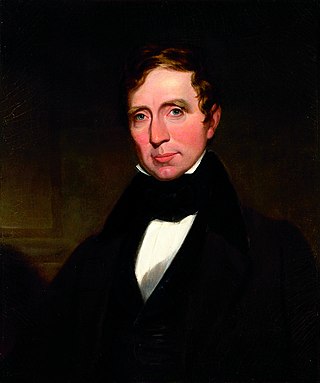Related Research Articles
The Methodist Episcopal Church, South was the American Methodist denomination resulting from the 19th-century split over the issue of slavery in the Methodist Episcopal Church (MEC). Disagreement on this issue had been increasing in strength for decades between churches of the Northern and Southern United States; in 1845 it resulted in a schism at the General Conference of the MEC held in Louisville, Kentucky.

Candler School of Theology is one of seven graduate schools at Emory University, located in metropolitan Atlanta, Georgia. A university-based school of theology, Candler educates ministers, scholars of religion and other leaders. It is also one of 13 seminaries affiliated with the United Methodist Church.

John Emory was an American bishop of the Methodist Episcopal Church, elected in 1832. He is the namesake for Emory University and Emory & Henry College, both Methodist-affiliated American universities.

James Edward Dickey was an American bishop of the Methodist Episcopal Church, South, elected in 1922.

Beverly Waugh (1789–1858) was an American who was a Methodist pastor, book agent, and Bishop of the Methodist Episcopal Church, elected in 1836.
Arthur James Moore was an American bishop of the Methodist Episcopal Church, South (MECS), the Methodist Church, and the United Methodist Church, elected in 1930.
Kenneth Lee Carder is a retired American bishop of the United Methodist Church, elected in 1992. Carder distinguished himself as a pastor, a member of Annual Conference and General U.M. agencies, a bishop, seminary professor, and an author.
William Ragsdale Cannon was the dean of Candler School of Theology (1953-1968) and an American bishop of the United Methodist Church, elected in 1968.
George Lindsey Davis is an American bishop of the United Methodist Church, elected in 1996.
Hazen Graff Werner was a bishop of The Methodist Church and The United Methodist Church, elected in 1948.
Timothy Wayne Whitaker is a bishop of the United Methodist Church, elected in 2001. Whitaker distinguished himself as a U.M. pastor, a college lecturer, a member of Annual Conference and U.M. General Agencies and community organizations, a district superintendent, an author, and as a bishop.

James Osgood Andrew was elected in 1832 an American bishop of the Methodist Episcopal Church. After the split within the church in 1844, he continued as a bishop in the Methodist Episcopal Church, South.
Clay Foster Lee Jr. is a retired American Bishop of the United Methodist Church, elected in 1988.
Earl Gladstone Hunt Jr. (1918–2005) was an American who distinguished himself as a Methodist pastor and evangelist, as the president of Emory and Henry College, as an author and theologian, as a bishop of The Methodist Church and the United Methodist Church, and as a leader in World Methodism.
Roy Hunter Short was an American bishop of The Methodist Church and the United Methodist Church, elected in 1948.
John Monroe Moore was a bishop of the Methodist Episcopal Church, South, elected in 1918.
Horace Mellard DuBose was an American bishop of the Methodist Episcopal Church, South and The Methodist Church, elected in 1918. Bishop DuBose gained notability as an author, editor, and a leader in the American temperance movement.
William Turner Watkins was an American bishop of the Methodist Episcopal Church, South (MECS) and of The Methodist Church, elected in 1938. He also distinguished himself as a Methodist pastor, as a university professor, and as an editor.
B. Michael Watson is a bishop of The United Methodist Church, elected in 2000. He served as resident bishop of the North Georgia Annual Conference, which comprises 1,000 churches, more than 1,500 clergy members, and more than 320,000 lay members. He retired in 2016 and currently serves as ecumenical officer of the Council of Bishops.
David W. Graves is an American clergyman in the United Methodist Church who is bishop of the Alabama-West Florida Conference. He was elected July 13, 2016 to the episcopacy at the Southeastern Jurisdictional Conference quadrennial meeting at Lake Junaluska, N.C. He served as resident bishop of the Alabama-West Florida Conference from 2016, and the South Georgia Conference from 2021. He will become resident bishop of the Tennessee-Western Kentucky, Kentucky, and Central Appalachian Missionary Conferences on September 1, 2024.